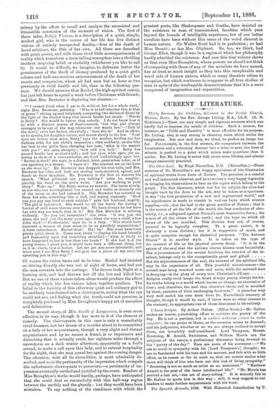The Olive-Leaf. By Hugh Macmillan, D.D. (Macmillan.)—These sermons of Dr.
Macmillan's are happy specimens of the illustration of spiritual truths from facts of Nature. The preacher is a careful and well-instructed observer, and he exercises a very happy ingenuity in bringing his observations to bear on the topics which belong to the pulpit. The first discourse, which has for its subject the olive-leaf brought back by the dove to the ark, may be taken as a specimen. It was " the first production of a new and regenerated world," and its significance is made to consist in various facts which science supplies,—viz , that the leaf is the great purifier of Nature ; that it is the source of all the life of the world, the best conductor of elec- tricity, i.e., a safeguard against Nature's most destructive force ; the source of all the rivers of the earth ; and the type on which all forms of life are moulded. This division does not, of course, pretend to be logically complete. To a great extent, it is obviously a cross division ; but it is suggestive of much, and is quite complete enough for rhetorical purposes. "The Autumn Crocus" is in another style. It is taken as the type of the renewal of life as the physical powers decay. " It is in the sphere of the soul that the autumn crocus blooms most beautifully. The rejuvenescence of the mental faculties, the renewal of the in-
tellect, belongs only to the exceptionally great and gifted But the rejuvenescence of the soul, the renewal of the spiritual life, may be the experience of all. This youthful victoriousness—the inward man being renewed more and more, while the outward man is decaying—is the glory of every true Christian's old age Religion really vivid keeps the heart always young, always tender Its truths belong to a world which knows no change, no succession of time; and, therefore, the soul that cherishes them, and is moulded by them, partakes of their unchanging freshness." A preacher may very well enrich his own store from Dr. Macmillan's treasury of thought, though it would be rash, if there were no other reasons to the contrary, to appropriate one of these discourses in its entirety.


































 Previous page
Previous page